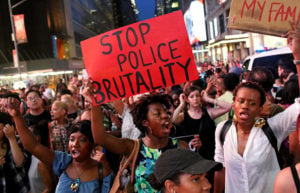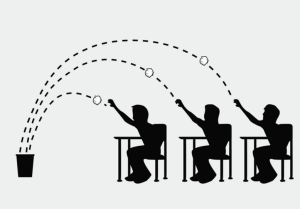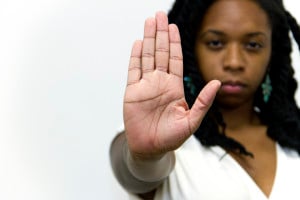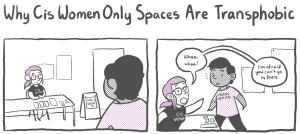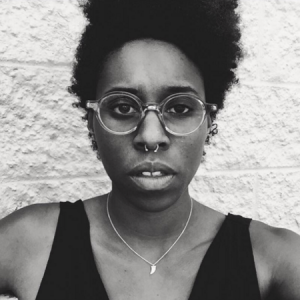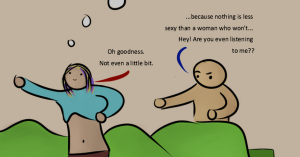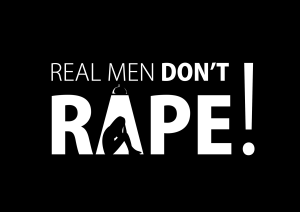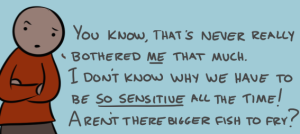Title: Making Safe(r) Space by Rhea Ewing
Panel 1
(A muppet-looking character (Leader Puppet) is talking to Rhea, proudly waving his noodly arms around.)
LP: It’s vital that our communities be safe, welcoming, and diverse! Unlike the many bigotted spaces
out there, full of bullying and ignorance, my communities are safe for all. For example, I run a book
discussion group and it’s a safe space for everyone, because I’m such a good person!
Rhea: Umm..
Panel 2
(Rhea looks skeptically at LP)
Rhea: Are you sure everyone feels that way about your group? …what about that thing that happened last week?
Panel 3
Text: LAST WEEK…
(An older man who is a member of LP’s book club has approached him after a meeting. The man looks nervous and uncomfortable. LP looks surprised.)
Man: …I have some concerns about what you said last time we met.
LP: What are you talking about?
Man: When you made that gay joke? And that rape joke? And I noticed all the people of color stopped coming…
Panel 4
(LP shrugs his noodly arms and looks dismissive.)
LP: Well, everyone in our group is straight… so who cares about a gay joke? Besides, if someone really had a problem with my humor, they’d just speak up. As for the people of color, I don’t know why they left. I can’t be expected to change anything if no one tells me.
Panel 5
(We are back in the present. LP still looks confused. Rhea is concerned.)
LP: What? It’s true!
Rhea: Okay, so first of all, let’s talk about invisible identities… There are lots of identities that you
can’t tell someone has just by looking.
Panel 6
(Rhea is pointing to a chalkboard with statistics on it. Ze has drawn people of a variety of appearances and identities above each statistic.)
Rhea: If you have a group of 100 people, more or less representative of the US population, then…(at least) 32 are survivors of sexual assault and/or domestic violence (whether you can tell or not), 20 have some type of disability (whether you can tell or not), between 2 and 10 are LGBTQ (whether you can tell or not), 18 have received food stamps (whether you can tell or not)
Text:
1. 7% of men and 25% of women experienced domestic violence. (US Dept of Justice 2000), 3% of men and 15% of women experience sexual assault (rainn.org)
2. US Census Bureau 2010
3. LGBTQ+ statistics are difficult to collect accurately, due to both social stigma and that accurate options are often unavailable (pansexual, genderqueer, asexual, and demisexual are rarely listed) Most statistics place LGBTQ+ identities between 1 & 10%
4. Food stamp numbers from the Pew Research Center, 2012
Panel 7
(LP is starting to look thoughtful and a little uncomfortable.)
Rhea: People might not choose to share that information with you for any number of reasons. Like maybe you keep making jokes about their identities.
Panel 8
(LP Is starting to sweat and look a little nervous as he realizes more about his past mistakes.)
Rhea: You should also be asking yourself some serious questions about why only white people want to be around you.
Panel 9
(LP is starting to fully realize how wrong he’s been about his supposed safe space. He looks horrified as Rhea continues to explain the situation.)
Rhea: Even if you’re not saying hurtful things, your actions might make people feel unwelcome, or you don’t react well when others speak out. Remember when…
Panel 10
Text: TWO WEEKS AGO…
(A boy with short hair, a long sleeve shirt, and bright pink fingernail polish is sitting across from LP. He looks nervous and sad. LP is unimpressed.)
Boy: People keep making fun of me because of my fingernails…
LP: Well, what did you expect to happen if you painted your nails? Look, people are going to be
saying stuff like that to you your whole life. You need to toughen up!
Panel 11
(We are back in the present. LP is on the defensive and is waving his noodly arms around. Rhea is getting angry now, too.)
LP: Don’t make that into a bigger deal than it was! If we were in a different state he’d get beaten up or murdered for looking gay. Some light teasing is nothing! He has no right to feel unsafe!
Rhea: So what,”Just be glad we’re not murdering you?”
Panel 12
(Rhea has started to regain composure.)
Rhea: Bullying is the systematic breaking down of a person’s identity, validity, and value for the pleasure, convenience, or increased status of other people. Often perpetrated through the use of…
Panels 13-16
(Each panel shows a flashback to LP perpetuating each aspect of bullying.)
Text: Humiliation
LP: What did you expect to happen?
Text: Isolation
LP: People are going to be saying that stuff to you your whole life.
Text: Intimidation
LP: If we were in a different state, you’d get beaten up or murdered!
Text: Denial
LP: Don’t make it a bigger deal than it was.
Panel 17
(LP is starting to sweat and look nervous again. Rhea has zir arms crossed and is irritated as he interrupts zir.)
LP: I’m not a bully!!
Rhea: -and Disruption. Whether you mean to be hurtful or not, it has the same harmful effects on others…
Panel 18
(LP is starting to break down, he has covered his face in shame. He does not want to be a bully, he wants to be a person who makes spaces safe for others.)
Rhea: …and tells everyone that they should either avoid you or hide the marginalized parts of themselves.
LP: You’re right…. …I’m a bad person!
Panel 19
(Rhea looks sympathetic.)
Rhea: It’s not about you being good or bad, it’s about having better tools. …want to learn a better
way?
LP: …yes.
Panel 20
Rhea: First, try to Educate Yourself! Learn as much as you can about other people’s experiences, and language and actions you can adopt to make things better! The internet is a great resource for this!
LP: “Intersectionality”? “Internalized bigotry”? So many big words! I’m going to seem so smart when I use them!
Rhea: …Just remember to stay humble, you’ll never know more about someone’s lived experience than they do!
Panel 21
Rhea: Next, practice Active Listening! Make sure everyone in your group has the chance to speak. If you overhear someone perpetuating a harmful stereotype, speak up! Correct them, offer resources, or sometimes just naming their behavior for what it is is enough. When someone approaches you with a concern, listen carefully and be active and compassionate. Thank them for taking the time to talk to you about it, it means they trust you’ll try to make things better! Then apologize for your behavior and take steps to avoid it in the future.
LP: (as he faces his book club group to apologize) I’ve said and done a lot of things in the past that have hurt a lot of you. I never intended to cause harm, but now I see that my good intentions aren’t enough. I’m sorry.
Panel 22
(They are at a party celebrating the birthday of Zora Huston. LP is looking at his cup and is disappointed that it’s a party with no alcohol.)
Rhea: Finally, Accept It’s Not All About You! Sometimes, your community might have goals and needs that are different from what you would have personally preferred.
LP: I was hoping there would be beer at this party…
Rhea: That’s okay! A healthy diverse space won’t share your priorities all the time. Relax and take
it as an opportunity to learn some new ways to have fun.
LP: That scrabble game does look kinda neat… …want to join them?
Rhea: Sure!
Panel 23
(Everyone is having fun at the party and talking amongst themselves. The group is a lot more diverse now, and Rhea and LP are playing scrabble with two new friends. LP is involved in the game but is not the center of attention. He looks calmer and happier than he has in the entire comic. The words “ The End” are spelled out on the scrabble board.)






